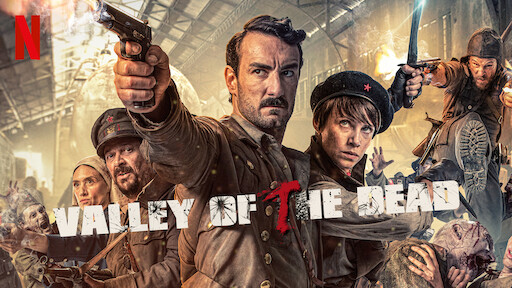Luchamos contra los zombis, rumba-la-rumba-la-rumba-la...
(Editor's note for American readers: When discussing the Spanish Civil War, the word ‘Republican’ has a very different meaning than in US politics. The Spanish Republican faction leaned left-wing and was fighting against Francisco Franco's overthrow of democracy.)
In Spain, there’s a joke that every Spanish movie is set during their Civil War, a war about which so much has been said. It is a dress rehearsal of World War II, the Nazis’ great weapons testing range, the last gasp of classical anarchism, a classic case of leftist infighting, colonial savagery brought home to Europe, a great blooming of international working-class solidarity, the root of the divisions of modern Spain. I never thought, though, I’d see that old joke made so literal:
A Spanish Civil War zombie movie?!
It makes sense, come to think of it. Call of Duty has had Nazi zombies for years, and the Wolfenstein games have certainly dabbled in the trope. There was enough occultism in Nazism for the trope to be so enduring, and the melding of historical evil and fantastic evil is natural. It flows logically, then, to switch up the premise by setting the German experiments with reanimation in the first country the Luftwaffe pulverized.
That film is Valley of the Dead, released in 2020 and directed by Javier Ruiz Caldera and Alberto de Toro.
There’s something vaguely ironic about this movie, as serious as it comes across; it feels like the directors, the cast, and basically everyone involved said, ‘Yes, we know this is silly, and we’re doing it anyway.’ The result is entirely po-faced, and frankly it’s better than a spoof. It is also, quite surprisingly, a serious attempt to reckon with the trauma of the Spanish Civil War, the conflict that left what is now a Western liberal democracy littered with mass graves.
The setup is, at its core, that of a fairly standard horror movie, with a cast of people who don’t get along particularly well isolated together to fight a supernatural evil. You have a motley band of Republican militants, complete with a Soviet-style political commissar (who acts as one of the film’s hate-sinks, deservedly), as well as a nun and one of the Moroccan mercenaries in fascist service. To my delight, he is not a racist caricature, not a savage, not a rapist (all images common in portrayals of Moroccans during the war).
There’s a razor-sharp wit to the dialogue that shows up more often than not, a wit that is grounded in a deep knowledge of the historical subject. These people are all grinding against each other in a way that feels ever-so-believable—you can absolutely buy that a nun would cooperate effectively with a female militia known only as the ‘priest-killer’ (‘matacuras’ in Spanish).
The film is not lacking for pyrotechnics, or for special effects. The zombies are properly scary, and Ruiz and De Toro know when to show them and when to let dread or character development take the lead. The two know not to wallow in aesthetics, to merely let the novelty factor (now not as nearly as new as it once was) ride out spectacle. In this regard, it reminds me of 2018’s Overlord, a film with its issues but one that I adore. This one is even more original by virtue of its setting.
There is one component I have my doubts about, and it made me a tad queasy after reading so much about this awful war. In the beginning, you are introduced to a hotshot Nationalist (read: fascist) soldier who has gotten himself in too much trouble and is put on an obvious suicide mission, upon which he stumbles into the drama with the zombies. In civilian life, he says, he was a corporate lawyer. I don’t object to having Nationalist characters sympathetically; those types of characters, fundamentally good people who are serving evil, are very important to show how evil lurks in everyone, and how we can be complicit in evil.
My issue is that he is the closest thing the film gives you to an ‘everyman’ character. No Republican character is portrayed as quite so ‘normal’ as he is; they all have quirks and eccentricities that move them somewhere beyond ‘normal.’ The first act of the film focuses on him, and the other acts less so, but he is clearly the ‘main’ character as it is. I don’t really know how to feel about how the audience surrogate is a grunt in fascist service, but it certainly gives me pause. It could have been brought out as commentary on the banality of evil (Franco was a rank opportunist, and the Moroccans who fought for him were mostly poor and desperate by my understanding), but the film doesn’t focus on that issue, to its detriment.
Valley of the Dead feels like a combination of two types of movies I like a lot: richly detailed historical films and schlock pulp fiction. It’s a combination that is occasionally done, not always well, but this film mashed them up in a way that I had never seen before. In the US, it’s on Netflix, and well worth the runtime.
Highlights: Great period detail, especially the vehicles.
Nerd Coefficient: 8/10.
POSTED BY: Alex Wallace, alternate history buff who reads more than is healthy.
